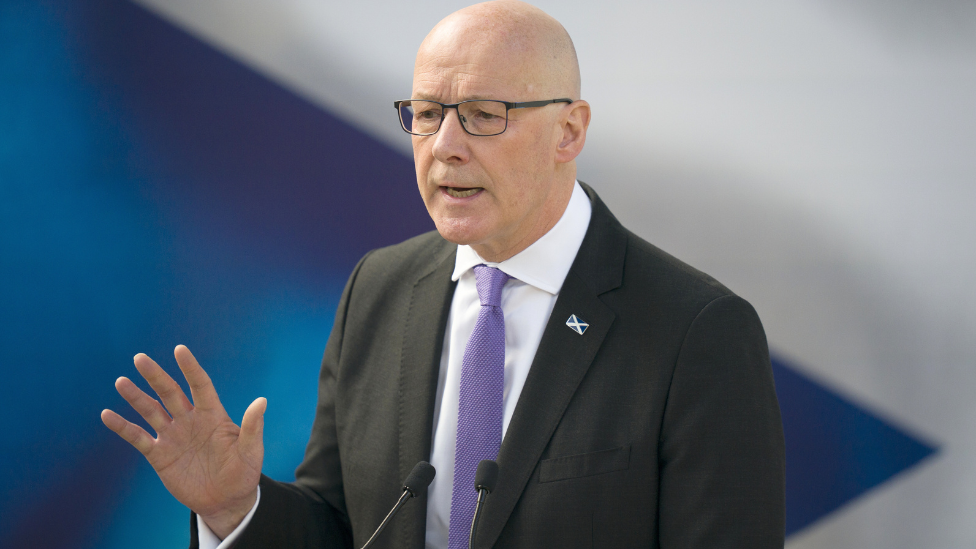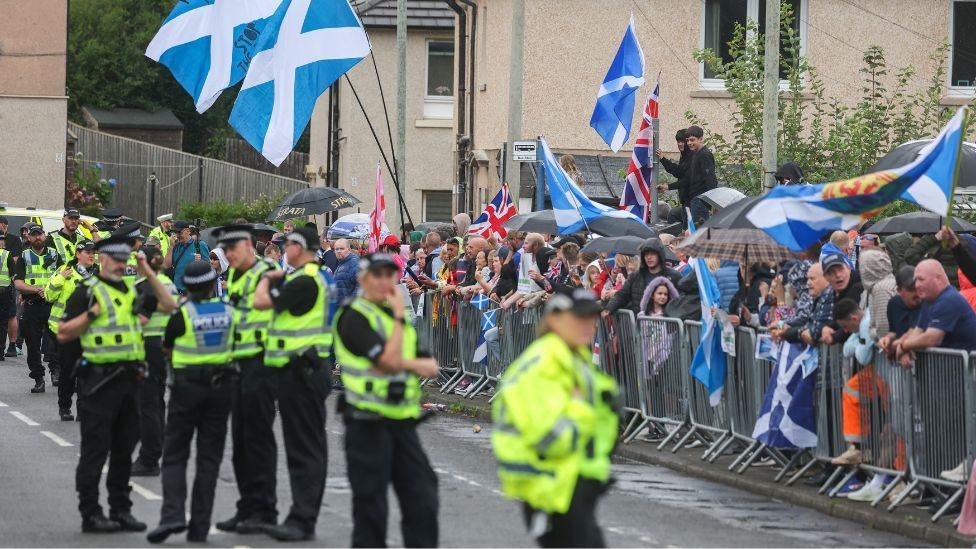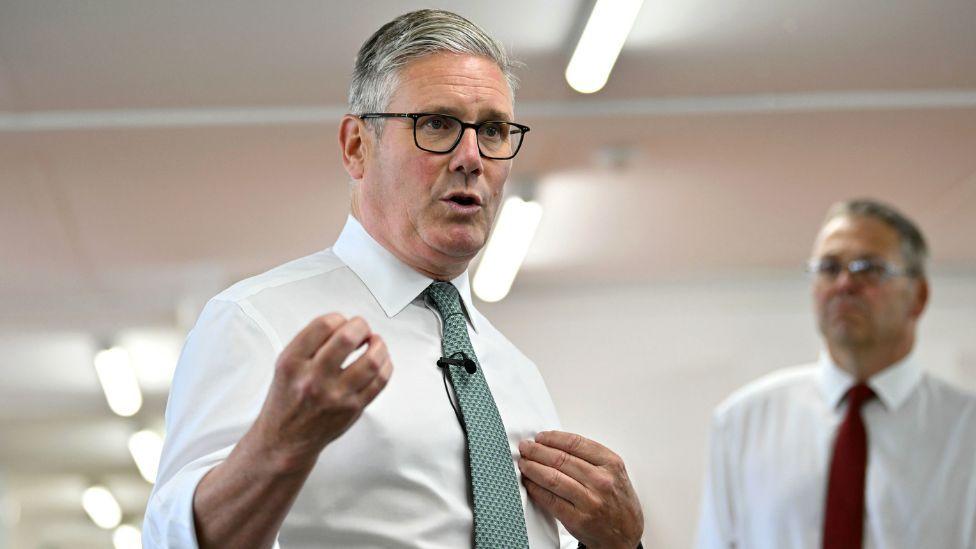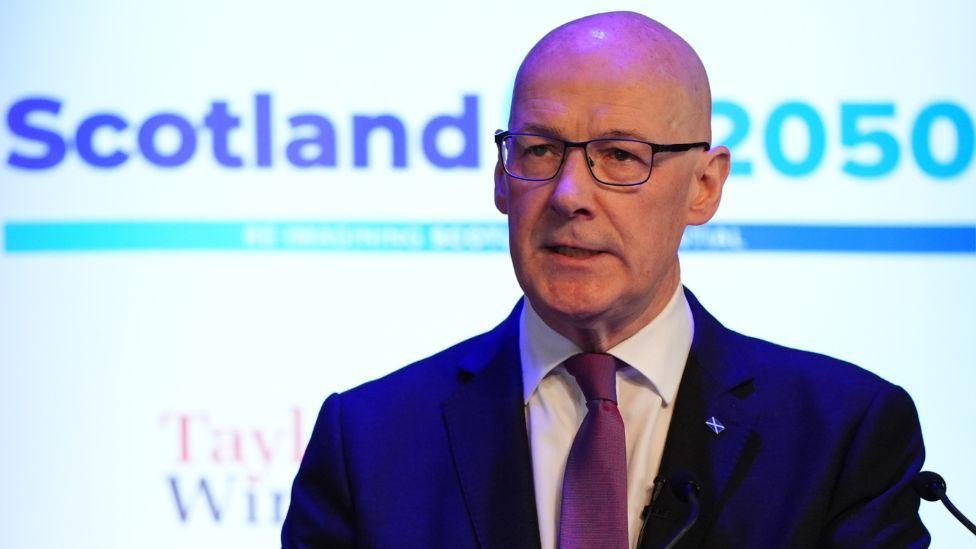Swinney sets out latest plan for an independence referendum

John Swinney's government has published a new independence paper
- Published
First Minister John Swinney has urged the UK government to agree to a referendum on Scottish independence if the SNP wins a majority at next year's Holyrood election.
But Prime Minister Sir Keir Starmer predicted the SNP would not win a majority and accused Swinney of "distraction politics".
At a speech in Edinburgh, the first minister encouraged Scots to "come together and demand a say over our future".
It came after the Scottish government published the latest in a series of papers on the constitution.
Swinney also accused Westminster politicians, including Sir Keir, of using "utterly chilling" language about immigrants.
And the SNP leader urged the prime minister to apologise for claiming that he had failed to welcome a £10bn shipbuilding deal securing thousands of jobs on the Clyde.
On a visit to BAE Systems shipyard in Glasgow, Sir Keir defended his immigration policies and urged Swinney to work with him to support jobs in Scotland.
Several prime ministers, including Boris Johnson have argued that the 2014 independence referendum was a "once in a generation" event.
But Swinney said that by 2030 there would be one million young Scots eligible to vote who were too young to participate in the 2014 referendum, adding: "That seems like a generation to me."
The first minister said that a precedent had been set in 2011, when a historic SNP majority in the Scottish Parliament paved the way for the 2014 independence referendum.
Holyrood elections in 2016 and 2021 - which returned pro-independence, but not SNP, majorities - did not lead to a second referendum, with successive UK governments refusing to sanction a second vote.
Swinney signals 2030 as ‘next generation’ for indy vote
Swinney said: "I think what we have to do to break the logjam is to repeat what we achieved in 2011 and make sure the UK government has no answer to escaping from the precedent that was established in 2011."
However, Constitution Secretary Angus Robertson suggested earlier that a majority of pro-independence MSPs from any party would also represent a mandate.
He told the BBC's Good Morning Scotland: "If the parliament, by a majority, including the SNP and who knows, perhaps others too, votes that something should happen that is not a lesser mandate. That is not less democratic."
Independence strategy
Shortly before Swinney's speech, the government published its new independence paper, external.
More than a dozen of the documents have been published since the series was launched by Nicola Sturgeon in 2022.
Political opponents have described them as a waste of time and money, while some within the SNP have argued for a more radical approach to securing independence.
The new paper, called Your Right To Decide, said that the 2011 election result had showed "that it is for the people of Scotland to decide when a referendum is to be held".
The Scottish government called on Downing Street to "accept and re-state that the UK government would not seek to prevent a clear majority of people in any part of the UK deciding to leave it through a fair and democratic process".
The SNP is due to agree on its independence strategy at a party conference next month.
In 2022, Supreme Court judges ruled that the Scottish government cannot hold an independence referendum without the UK government's consent.
In recent years support for independence has hovered at about 50% in the polls, while support for the SNP has declined from peaks under Nicola Sturgeon's leadership.

Saltires have been on display at recent anti-immigration protests
At the event in Edinburgh, Swinney accused Sir Keir of "toadying along" behind Reform UK leader Nigel Farage as he criticised "utterly chilling" language used about immigration.
He cited reports of calls for "mass deportations" after Farage said Reform would be prepared to deport 600,000 migrants if it won power at the next election. Farage said his party's "credible plan" could help stop illegal immigration.
Swinney described as "dreadful" Reform's proposal to take the UK out of the European Convention on Human Rights, a treaty designed to protect human rights and political freedoms,
In his speech, the first minister said: "I'm ringing the alarm bell for our values, for our common humanity, for our commitment to the oppressed and for those seeking sanctuary.
"Friends, let us join with others in saying unequivocally: Our saltire is a flag of welcome – and refugees are welcome here."
The comments came after saltires were used at anti-immigration protests outside hotels used to house people in the asylum system, mimicking displays of St George's flags and union flags on England's streets.
Flags have since been put up in some streets in Glasgow, while councils in the north east of Scotland have said they will remove saltires which have been tied to street lights without permission after dozens appeared in recent weeks.
Aberdeenshire Council said it had to suspend the removal of flags after workers faced threats and intimidation.

Sir Keir Starmer dismissed the first minister's plans for a second independence referendum
Swinney also took aim at Sir Keir over comments he made at Prime Minister's Questions on Wednesday.
The UK government announced over the weekend that it had agreed a £10bn deal to supply the Norwegian navy with at least five new warships.
The vessels are to be built at BAE Systems' Glasgow shipyards, supporting more than 2,000 jobs at the yard, ministers said.
In the Commons, Sir Keir claimed Swinney had said "absolutely nothing" about the announcement.
However, Swinney had already welcomed the deal in comments to the media.
Answering a question from BBC Scotland News after his speech, the first minister said: "The prime minister was completely inaccurate in what he said in attacking me in the House of Commons.
"And if he wants a respectable relationship with the Scottish government he should go to the House of Commons and apologise for what he said."
Scotland's population tops 5.5m for the first time
- Published14 August
Migration: How many people come to work and study in the UK?
- Published2 September
On a visit to Glasgow, the prime minister dismissed Swinney's proposals for a second independence referendum.
"I don't think there's going to be a majority of the SNP after the election," he said. "And in any event, this is clearly distraction politics."
Sir Keir claimed Swinney could have been more "full-throated" in his welcome of the frigates deal, which he said would support good jobs in Scotland.
The Labour leader told the BBC: "I want to work with him [Swinney] on those projects, not getting distracted in the usual old way of going down constitutional routes.
"Let's see him fix the health service and other public services, and let us work together on the jobs that we can win for Scotland."
He also rejected any comparison to Farage.
"Nigel Farage is the complete opposite of me in politics, because he feeds on grievance. He wants problems to exist," Sir Keir said.
"I want to fix the problems. I want to renew the whole of the United Kingdom and work closely with everybody in Scotland in order to do so."
Scotland's population recently reached record high of 5.5m, with the country relying on migration from elsewhere in the UK and overseas to offset a falling birth rate.
Swinney has called for the UK government, which controls immigration, to allow Holyrood to set up a bespoke system north of the border to help Scotland deal with its distinct demographic issues.
The prime minister said he was committed to tightening immigration rules "to make sure that people come here lawfully".
He added: "We need to get the right fit, whether it's for Scotland or anywhere else - the right skills in the right places. But the overall number does need to go down."
'Get back to day job'
At First Minister's Questions, Scottish Conservative leader Russell Findlay urged Swinney to "get back to the day job" and criticised the government's "dismal record of failure on the economy".
Scottish Labour leader Anas Sarwar told MSPs that fixing the NHS should be Swinney's priority.
He added: "Instead he's trying to use independence to hide from his failures and desperately trying to cling on to power and it's not going to work."
Reform councillor Thomas Kerr accused the first minister of being "arrogantly out-of-touch".
He said: "The country is at breaking point, yet has-been Swinney would rather grandstand than put his own people first."
- Published17 June
